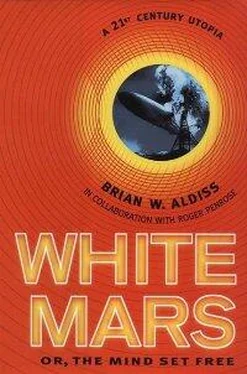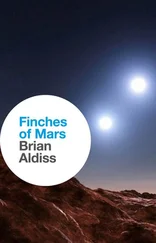Brian Aldiss - White Mars
Здесь есть возможность читать онлайн «Brian Aldiss - White Mars» весь текст электронной книги совершенно бесплатно (целиком полную версию без сокращений). В некоторых случаях можно слушать аудио, скачать через торрент в формате fb2 и присутствует краткое содержание. Год выпуска: 1999, ISBN: 1999, Издательство: Little, Brown UK, Жанр: Фантастика и фэнтези, на английском языке. Описание произведения, (предисловие) а так же отзывы посетителей доступны на портале библиотеки ЛибКат.
- Название:White Mars
- Автор:
- Издательство:Little, Brown UK
- Жанр:
- Год:1999
- ISBN:0-316-85243-0
- Рейтинг книги:5 / 5. Голосов: 1
-
Избранное:Добавить в избранное
- Отзывы:
-
Ваша оценка:
- 100
- 1
- 2
- 3
- 4
- 5
White Mars: краткое содержание, описание и аннотация
Предлагаем к чтению аннотацию, описание, краткое содержание или предисловие (зависит от того, что написал сам автор книги «White Mars»). Если вы не нашли необходимую информацию о книге — напишите в комментариях, мы постараемся отыскать её.
White Mars — читать онлайн бесплатно полную книгу (весь текст) целиком
Ниже представлен текст книги, разбитый по страницам. Система сохранения места последней прочитанной страницы, позволяет с удобством читать онлайн бесплатно книгу «White Mars», без необходимости каждый раз заново искать на чём Вы остановились. Поставьте закладку, и сможете в любой момент перейти на страницу, на которой закончили чтение.
Интервал:
Закладка:
Crispin said, “You want to advance towards the betterment of mankind? Maybe it can be done, maybe not! But let’s have a try, Tom. After all, it gives our lives here an objective. Betterment means a break with the past—chop, like that!—not just a continuation of it, as would have been the case had the terraformers and realtors had their way. Maybe we can do it. But I’d be against any suspicion that sexuality and eroticism was not in itself one of mankind’s blessings. The older I get, and the more difficult sex gets, the more I become convinced it holds the meaning of any valued life.”
I could but agree. “We must try to influence minds. It is important—and not just for our little outpost here. We’re not going to be isolated for ever. Once EUPACUS or its successors have been reassembled, once the world economy has picked up, ships are going to be operating again.
“By that time, we must have our mini-utopia up and running. Just to be a shining example to Earth, to which most of us wish to return.”
“Then maybe on Earth, as in good old Wallace’s island community, the ideal might be reached, where each man scrupulously regards the rights of his fellow man.” As he spoke, Crispin gazed earnestly and short-sightedly into my eyes. “Like not shooting him or fucking his wife.”
He was a good man. Talking with him, I was convinced we could become a better, happier, humanity—without the pathetic need of saccharine/strychnine drips.
“Now you’d better go and coopt Skadmorr,” he said. “She’ll lower the average age of Adminex by a few years!”
I was up early next morning. Runners and the semi-flighted were already about in the streets, exercising. Although we had yet to solve the question of the Martian date line, we had solved the problem of dividing up the days and weeks. Mars’s axial rotation makes its day only sixty-nine minutes longer than Earth’s day. In the time of EUPACUS, an extra “hour” of sixty-nine minutes had been inserted to follow the hour of two in the morning. This was the “X” hour. The other hours conformed to the terrestrial twenty-four.
The innovation of the “X” hour meant that at first terrestrial watches had to be adjusted every day, until an ingenious young technician, Bill Abramson, made his reputation by inserting what he called “the ‘X’ trigger,” which suspended the momentum of watches and clocks for sixty-nine minutes every night, after which they continued working normally as before.
Since an hour is basically the way we measure our progress through the day, there were few complaints at this somewhat ad hoc arrangement. But it did mean that human activity restarted fairly early in the day.
Taking in the scene around me, I could only appreciate the change from the city on Earth I had left, with its gigantic byzantine structures housing thousands of people, walled in like bees in their cells with Ambient connections supplying many of their needs, the facades of these structures awash with pornographic images once sun had set. Below those great ragged skylines, below the coiling avenues, lived the impromptus, subsisting on the city’s grime, anaesthetised by the free porntrips overhead.
But here, under our low ceilings, was a more hygienic world, where coloured plastic ducts were running in parallel or diverging overhead, with jazzy patterns in rubber tiles below our feet and stylised lighting. Birds flew and called among the plant clusters at every intersection. It was at once more abstract and more human in scale than terrestrial cities. I recalled an exhibition I had attended in my home city hall of the paintings of an old twentieth-century artist, Hubert Rogers. Those visions of the future that had so inspired me as a young man were here realised. I recalled them with pleasure as I hopped on a jo-jo bus.
So it was just before six o’clock that I called on Mary Fangold at the hospital for a coffee. I liked to talk over events with this reasonable and attractive woman—and incidentally to visit my adopted daughter, whose implanted leg was now almost completely regenerated.
The first person I encountered was Kathi Skadmorr. She was striding out of the gym with a towel round her neck, looking the picture of health.
“Hi! I was watching your discussion of the prevalence of violent and sexual material. I thought you were talking sense for once.” She spoke in a friendly way, regarding me through those dark, lash-frilled eyes of hers. “What we usually do in private should remain private. Ain’t that what you were saying? It’s pretty simple really.”
“Bringing about the change is a problem, though. That’s not simple.”
“How about telling people to keep it quiet?”
“It’s better to get people’s consent rather than just telling them.”
“You could tell them, then get their consent. Remember the old saying, Tom: Once you get folk by the balls, their hearts and minds will follow.” She giggled.
“So what are you doing here, so early in the morning?”
“I came over from the science unit to see Cang Hai. Then I did an hour’s work-out. Are you visiting your daughter?”
“Um, yes. Yes, I am.”
She then asked me what I made of Cang Hai’s Other, her mental friend in Chengdu. I had to admit I had really not considered it. Her Other did not impinge on my life.
“Nor apparently does your daughter,” she said with a return to her earlier asperity. “She really loves you, you know that? I believe she has an unusual kind of consciousness, as I have. Her Other may be a kind of detached reflection of her own psyche. Or it may be a little encapsulated psyche within her own psyche, like a—a kind of cyst within her soul. I’m studying it.”
At this juncture, Mary appeared. She was direct as usual and told us to enter her office for coffee and a talk. “But it had better be a brief talk. Say twenty minutes at most. I have a lot to do today.”
As we sat down, I asked Kathi if her unusual kind of consciousness was also a “cyst within her soul”. I used her phrase.
“My consciousness embraces an external. It embraces Mars. It’s all to do with the life force. I’m a mystic, believe it or not. I’ve been down into the gullet, or maybe the vagina, of this planet, into its bladder. I have nothing but contempt for those thirty or however many it was who committed suicide here. They were prats. Good that they died! We don’t want people like that. We want people who are able to live beyond their own narrow lives.”
“They were all victims, cut off from their families,” Mary Fangold said.
“They didn’t do their families much good by killing themselves, did they?”
She crossed her long legs and sipped at the mug of coffdrink Mary had brought. Almost to herself, she said, “I thirst for what Tom proposed—the mind set free!”
Mary and I started to talk together, but Kathi cut us short, speaking eagerly. “You should get rid of all this flaunting of sex, as you say. Sex is just a recreation, after all, sometimes good, sometimes not so good. Nothing to be obsessed about. Once you get it out of the way you can fill everyone’s minds with real valuable things, mental occupations. Without TV or the other distractions, we can be educated in science in all its branches. We must learn more, all of us. It’s urgent. ‘Civilisation is a race between education and catastrophe’—you remember that saying? Education throughout life. Wouldn’t that be wonderful?”
Somehow I did not take that opportunity to invite her to join Adminex. I felt she might be too disruptive. However Kissorian asked her a few weeks later. Kathi turned down the offer, saying she was not a committee person. That we could well believe.
Kissorian had a piece of gossip too. He said Kathi was having a love affair—“frequently in the sack’, was his way of putting it—with Beau Stephens. We thought about that. Beau at this time showed little ambition, and was working on the jo-jos.
Читать дальшеИнтервал:
Закладка:
Похожие книги на «White Mars»
Представляем Вашему вниманию похожие книги на «White Mars» списком для выбора. Мы отобрали схожую по названию и смыслу литературу в надежде предоставить читателям больше вариантов отыскать новые, интересные, ещё непрочитанные произведения.
Обсуждение, отзывы о книге «White Mars» и просто собственные мнения читателей. Оставьте ваши комментарии, напишите, что Вы думаете о произведении, его смысле или главных героях. Укажите что конкретно понравилось, а что нет, и почему Вы так считаете.










